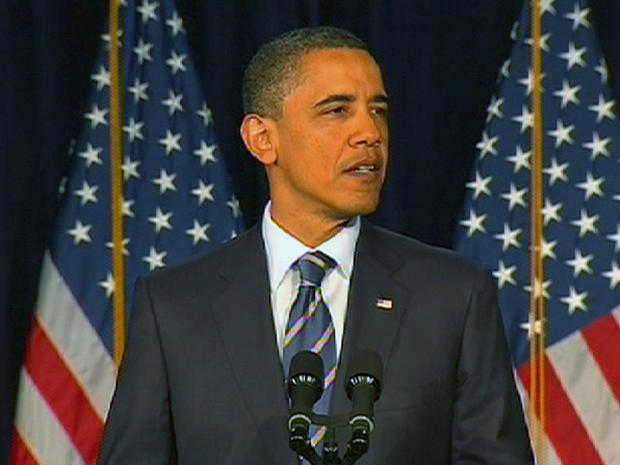Is Social Security on the table as Obama, Congress tackle the deficit?
As part of his plan to cut the national deficit, President Obama said he wants to avoid "slashing" Social Security, but he said that changes to the popular retirement program are necessary.
"Any serious plan to tackle our deficit will require us to put everything on the table," Mr. Obama said, as he gave an outline of ideas to achieve $4 trillion in deficit reduction over twelve years. (watch the full speech here)
The president's remarks come as some Democrats in Congress are joining Republicans in calling for modifications to the program, even as their liberal base cries out for the party to protect Social Security.
"There are those who believe we shouldn't make any reforms to Medicare, Medicaid, or Social Security out of a fear that any talk of change to these programs will usher in the sort of radical steps that House Republicans have proposed," Mr. Obama said today. "I understand these fears. But I guarantee that if we don't make any changes at all, we won't be able to keep our commitments to a retiring generation that will live longer and face higher health care costs than those who came before."
It's on: Obama takes iron fist to GOP
Obama's goal: Cut deficit by $4T over 12 years
GOP blasts Obama's deficit reduction plan
Mr. Obama said Social Security is not the cause of the deficit. However, he pointed out that it represents a large portion of the federal budget and said it "faces real long-term challenges in a country that is growing older."
This year alone, Social Security is projected to collect $45 billion less in payroll taxes than it pays out in retirement, disability and survivor benefits, according to the Congressional Budget Office. By 2037, the program is projected to run out of its $2.5 trillion surplus. At that point, Social Security would collect enough in payroll taxes to pay out about 78 percent of benefits, according to the Social Security Administration.
As Slate points out, this problem could be solved by simply imposing the payroll tax on income above $107,000, where the tax is currently capped.
Mr. Obama did not endorse raising the payroll tax or making any other specific changes to Social Security; however, he drew some lines in the sand in order to protect the program.
"Both parties should work together now to strengthen Social Security for future generations," he said. "But we must do it without putting at risk current retirees, the most vulnerable, or people with disabilities; without slashing benefits for future generations; and without subjecting Americans' guaranteed retirement income to the whims of the stock market."
Last week, House Republicans released their 2012 budget proposal, which also aims to make a significant dent in the deficit -- but it did not include any specific proposals with respect to Social Security (although the GOP plan suggests drastic changes to Medicare). House Budget Committee Chairman Paul Ryan said that, in writing the budget plan, he left out Social Security proposals because he is "cautiously optimistic" about reaching a bipartisan agreement on the issue.
Three Republican senators today unveiled their own proposals for Social Security reform, which include reducing benefits for some wealthy Americans and gradually raising the retirement age to 70 years old by 2032.
"If you talk to young people in America, they've already accepted this," Sen. Rand Paul of Kentucky said today. "This is a solution, we're not afraid to propose a solution. That is what this town needs, what the country needs."
Paul and Sen. Mike Lee of Utah -- two new senators who were elected to Congress in 2010 with the support of the Tea Party -- joined Sen. Lindsey Graham in South Carolina to create the proposal.
"I'm here to tell you if you propose saving Social Security by raising taxes, it will not get the votes," Graham said today. "This is the way forward that saves Social Security."
Paul told CBSNews.com's "Washington Unplugged" today that he's willing to take the lead on controversial issues as long as some Democrats are willing to join him.
Some Democrats appear open to these ideas. The Hill reports that Sens. Tom Carper (D-Del.), Dianne Feinstein (D-Calif.) and Joe Lieberman (I-Conn.) are all openly calling for reform and could accept a plan to raise the retirement age.
"My sons are 21 and 22; neither of them thinks Social Security is around for them. I want to make sure that it is," said Carper, "It's going to have to be a combination of very modest adjustments in benefits, very modest, and some frankly fairly modest changes with respect to revenues."
Liberal activists have been quick to point out that raising the retirement age would cut off benefits for a portion of Social Security recipients.

